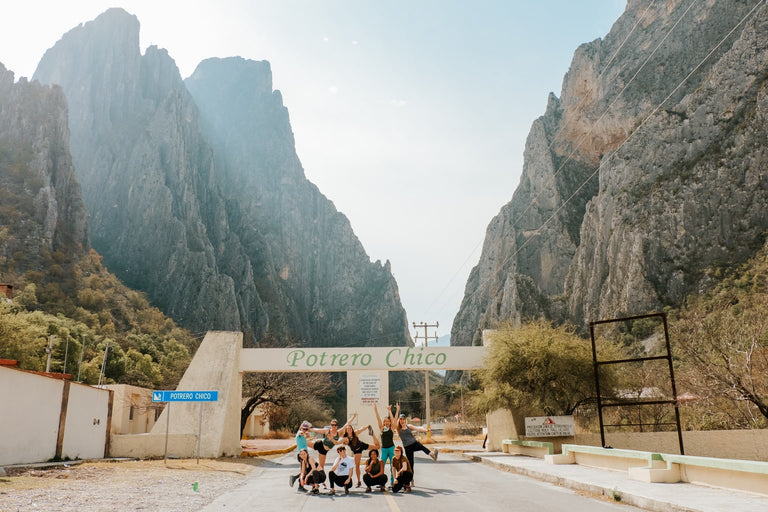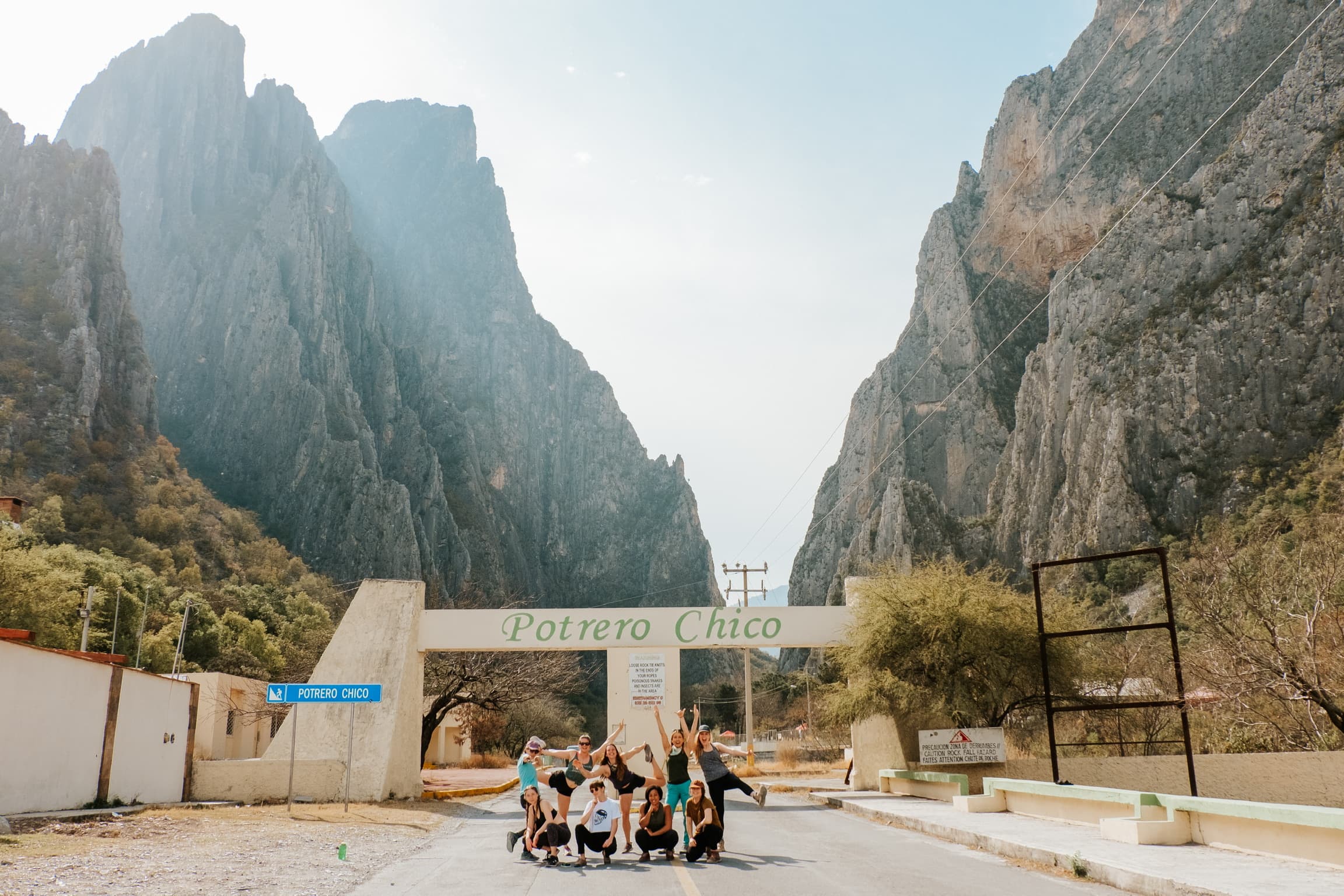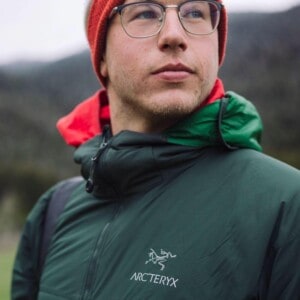In 2019, Savannah Manning and Carey deVictoria-Michel launched Space Below Your Feet, which, at its core, is a women-led company that strives to provide high quality adventures through rock climbing and in-depth technical skills from American Mountain Guide Association professionals. But, beneath its surface, Space Below Your Feet (SBYF) is much more than simply an adventure-based tourism company; it’s an inclusive collective of individuals who aspire to change the world, one small step at a time.
Since its inception, SBYF has brought on new team members and expanded its reach. Now, SBYF leads climbing retreats all over the globe (though, SBYF’s trips were put on hold during COVID). These retreats are created to educate and inspire those who participate in them, and are meant to create a lasting impact with the communities that SBYF trips visit and get to know.

Gnarly athlete and professional rock climbing guide, Genevive Walker, is also part of the SBYF crew. One of her main goals in guiding, climbing and at SBYF is to create a more inclusive community. To help reach this goal, Genevive, Savannah, and the rest of the SBYF team created a BIPOC Women’s Scholarship, which will help close the gap in making the outdoors accessible to all by providing two fully paid retreats to individuals who identify as a BIPOC female. With the help of donations received through our new Fueling Clinics, we at Gnarly have pledged to provide funding for one one full BIPOC Women’s Scholarship with SBYF.
Recently, we sat down with Savannah and Genevive to talk climbing, community, making lasting change, and the BIPOC scholarship. Scroll down to read the full interview!
TELL US ABOUT THE BEGINNINGS OF SPACE BELOW YOUR FEET
Savannah: When I was 23, I joined up with an all-female guide team and started my own branch of the company in the southeast… After a few years, I ended up branching off with one of the women from the company, Carey deVictoria-Michel. We discovered that we shared similar wants and values and dreams, so we hashed out the idea for SBYF. We really just wanted to do something that was bigger than ourselves, and wanted to make a difference.
How about the name?
Savannah: Someone introduced me to the book “Space Below Your Feet,” written by Gwen Moffett. Gwen was a badass lady for her time. She climbed 5.10 barefoot and was Britain’s first female mountain guide. She inspired us to be confident in ourselves, and to be a badass, too.

Why start Space Below Your Feet in the first place?
Savannah: I went to Georgia Southern University and graduated with a degree in Environmental Science and Creative Writing. After that, I bopped around between a few 9-5 jobs and rock climbed a lot. But I’m a passion-purposed-based person. I can’t hold a traditional job because there is either no purpose, no passion, or too much of one but lacking the other. I also didn’t feel like I could only be a guide. I needed a balance.
When I was climbing a lot after school, I became a regular in El Potrero Chico, Mexico. I fell in love with that place, and really wanted to help everyone there by bringing money and people to help grow the community there. This was the starting point for SBYF.

What was it like to build this organization from scratch?
Savannah: Starting a business has a lot of ups and downs. Initially, I was doing most of the work and had to learn the ins-and-outs of business. But I want this organization to be a creative collaboration, in a way. Carey is easy-going and an artist, which helped a ton.
I really just want people who become involved with SBYF to treat it as their own company. Our foundation is that we want people to be similar so we all gel, but to offer different perspectives, too.
Is Space Below Your Feet now your full-time gig?
Savannah: I split time between SBYF and another job at a nonprofit wildlife group based in Boulder, called The Wild Foundation. And I do a lot of climbing in between. But the thing about owning a small business is that if I or someone else doesn’t check off a task, then nothing gets done. So we don’t have official working hours, but we’re always doing something.
Genevive: I’m a seasonal part-time with SBYF. I honestly don’t want to become a full-time guide at the moment since I currently live on the and am always climbing, and have a fear of becoming burnt out. Adding in the work element makes it super tiring, especially with a five or six day retreat. But what I like about SBYF retreats is that we get women of all different skill levels, and everyone is there because they want to learn something, whether it’s tying a new knot or anything after. I really like teaching, which is why I love SBYF retreats, instead of just bringing people up the wall for an experience.

Tell us about the retreats.
Savannah: We get a wide variety of age and diversity, which is beautiful. We see so many people with different backgrounds connect throughout a short period of time. People come on our retreats alone and kind of scared, because they only know the guides and may not have traveled internationally before.
How have you seen people change or grow because of SBYF retreats?
Genevive: We had one lady who came to Mexico to climb outside, and didn’t even know how to tie a Figure 8. She only climbed a handful of times before, all in the gym. It was amazing to teach her brand new skills. She was also a photographer, and by day two or three, she was excited to get into climbing photography. Just in the first few hours of the retreat, she learned all the basics and then a few days later was hanging up at the anchors all day taking photos. It was so cool to see so much growth with her.
We’re also all together on these retreats, 24/7, and everyone is so excited to learn and motivate. That shared energy keeps people going all day, every day. It’s empowering for these individuals who may have never climbed or traveled before to be around a bunch of other women in this space. We also see our clients interact with other climbers in camp. These people are usually shy at first, but then really grow into themselves. Traveling solo as a female is difficult, scary and intimidating. It’s great to see someone come into a retreat having not traveled much, then get to the point where they want to step out on their own. It’s awesome to watch everyone grow over just a few days.
Tell us about the work outside of climbing that SBYF participates in.
Savannah: SBYF has three main focuses beyond climbing: Youth & At-Risk, Rebolting & Stewardship and Non-Profit Collaboration.
On one retreat, we worked with Son of a Saint to bring young boys climbing in Sand Rock, Alabama. Some had never seen the night sky with stars because they’re all out of New Orleans. They enjoyed climbing, but not camping. We ended up having monsoon-like weather down there! It was a bummer, but the boys got a kick out of the thrilling adventure. We want to work with more of these groups. It’s always hard to introduce new people to climbing because you want their introduction to be sustainable, but also long-lasting.
In 2019 me and a friend re-bolted El Sendero Luminoso in Mexico. My good friend and I also fixed a handful of other routes in El Potrero Chico. That area needed some love at that point – bolts were literally falling off the wall. We also re-built trails there.
When I was working a bit with the other women’s guiding company, we went to Outdoor Retailer and partnered with So-iLL, they had a breast cancer campaign. We offered cancer survivors free spots to top-rope for the day. I want to do more initiatives like that in the future with SBYF.

Genevive: We donated a bunch of paint and scaffolding materials to a group in Mexico that was building a school in the local area. This group we helped valued education and promoted learning in children to help them become better prepared in life. We took all SBYF clients to repaint the walls, re-build the desks and just help where hands were needed. One of our clients was a construction worker, which was super helpful but also empowering to watch another female take lead, delegate tasks, and teach men how to use power tools and construct- especially in a space that’s ususually seen as a “man’s job” in modern society.

How do you decide which locations to visit on SBYF retreats?
Savannah: We choose an area that is affordable, accessible, and has a wide range of climbing. And there needs to be some other draw to it – some sort of stewardship or community component. We don’t just want to exploit a place we visit, we want to leave it better than we found it.

Tell us more about the BIPOC scholarship - why did you start it? How did this idea come about? What is your goal?
Genevive: When I first got into climbing, I had a bunch of guy friends who were going into the SPI course and who were taking the exam. I never knew other female guides, though, so it didn’t seem like something that was attainable to me. But after taking the exam, I realized I was way more competent than I knew, but I just didn’t have the confidence.
After getting my SPI, I asked myself what I wanted to do with it. I didn’t just want to be a guide. I wanted to create change, too. As a woman of color, this has always been in my mind – how can I uplift my own community? I could count on one hand the number of women I knew who were in leadership positions within climbing, none who were of color, and this had to change. I figured out that I wanted to make climbing more accessible to women and the BIPOC community, but wasn’t sure exactly how.
After connecting with Sav in 2019, the natural trajectory for me has been to grow in women-focused communities, but after everything that happened in 2020, I realized I wanted to put a lot more focus on the BIPOC community, too.
I haven’t experienced a lot of melanin in these women-centered climbing spaces, which is a huge problem for me. Sure, I’m helping women uplift themselves, but it almost feels like I’m perpetuating the bigger issue, which is the lack of accessibility and inclusivity in climbing. At the end of the day, an international retreat is expensive no matter what, which is a huge barrier for many people. I don’t think this scholarship will be a long-term fix to his problem by any means. But even if it gives one person the chance to step away from the stressors in life for a minute and have the ability to focus on themself in a welcoming space, then it’s worth it to me.
what does the future look like for sbyf?
Savannah: One idea I have is to create a donation-based clinic where people can come and learn from the SBYF crew, and we can provide a little festival where people can come and learn and they don’t have to pay an arm and a leg to do so.
Overall, we’re both still really young and we’re figuring out where we fit in our space. We’re trying not to create harm or negativity in our process. We don’t want to throw anything out that’s trendy or short-lived, we want to create lasting change.

Genevive: I would love to host an entire BIPOC retreat, or more clinics. There are a lot of people of color who already climb, or are just getting into it, and it’d be great to support folks who want to advance their skillset.
For me, personally, it’s about how I can make an impact on my community. I compare myself with others, but I realize that it takes time to achieve growth and change. But I know that change will come.
To help make a difference, consider signing up for a Gnarly Fueling Clinic with a donation. And if you know someone who qualifies, please apply for the BIPOC Women’s Scholarship.




